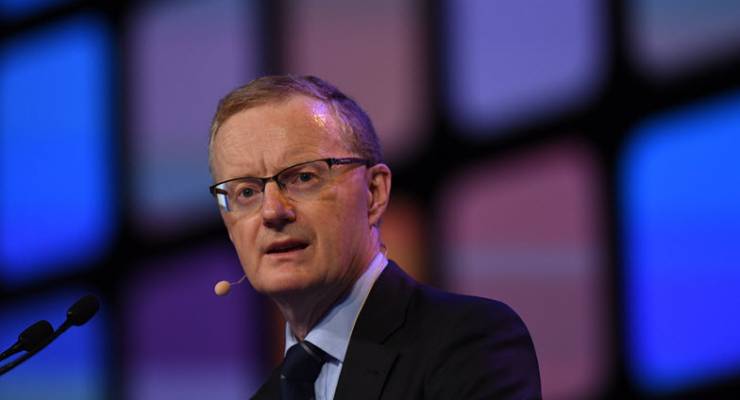
Reserve Bank governor Philip Lowe has for the first time explicitly linked industrial relations to wage stagnation, as he hardened the central bank’s public view that low inflation would be the norm over the medium term.
Speaking in Portugal at a panel of central bankers, Lowe again questioned whether Australian wage growth will accelerate from its current 2% level, and saw little chance of inflation helping lift wages higher in the immediate future — or of monetary policy being able to change that.
“The effectiveness of more monetary stimulus to solve the lack of inflation is questionable, I see clear risks from doing that,” he said. “I don’t see the risk-reward trade-off being particularly effective.” He went on to claim that, with inflation low and solid jobs growth, more monetary stimulus would push up asset prices which would eventually lead to problems when interest rates rose.
That appears to rule out the possibility of an interest rate cut if wages and inflation remain stubbornly low, although that would obviously change if the labour market stops improving. The bank has started noting in its monthly meeting minutes that the Australian labour market’s rate of growth is now slowing — as recent jobs data has shown.
Lowe repeated his recent observation that “the current rate of wage growth isn’t consistent with us achieving our inflation target on a sustained basis” given that wages growth had “surprised on the downside”. He also pointed out that a number of countries were grappling with the same issues, suggesting wage stagnation issues were “probably global” and “probably structural”.
“The system looks less inflation prone than it once was,” he said. “We just need to accept inflation will be lower for a while.”
Where Lowe went further was in discussing the causes of wage stagnation — which he recently linked to uneven technology distribution. For the first time, he also linked industrial relations to low wages growth — picking up a theme that emerged earlier this week in the Bank’s June minutes, which noted that stronger wages growth was occurring in sectors with collective agreements. He referred to a German paper given to the conference on Tuesday which he said noted that “changes in the industrial relations landscape in Germany has affected wage and employment outcomes … and the Australian experience is very similar to the German one”.
“It is hard to escape the conclusion that changes in the industrial relations process has changed the inflation process,” he added.
Lowe went on to suggest three causes of wage stagnation: the changed nature of industrial relations, the aforementioned rise of technology, especially in services (which he saw as the more important), and the growing flexibility of the labour market with rising participation rates among women and older workers, particularly older males.
It’s another step in the Bank’s path away from the business-as-usual view that wages growth will be along soon enough courtesy of jobs growth — now there’s official recognition that there’s a structural problem holding back wages. It makes the government’s continued Pollyannaish optimism on wages look even sillier.









Now now, we should all be aspiring to get “better jobs”, don’t you know?
“You are nearing BCA Utopia – screw down the wages.”
Maybe he reads the comments on Crikey! Finally seeing the light, perhaps?
Na, just joking, that one was for Jack Robertson!
Wage stagnation is clearly a problem, which Lowe has linked to the lack of clout of collective bargaining power in industrial relations of wage earners.
It was interesting on The Drum on Monday to hear a guest talking of ‘pyramid contracting’ being a major cause of the shortage of apprenticeships in the construction industry, which to my mind is linked to this problem. It seems everyone in this industry is a contractor, so therefore not in a position to collectively bargain for improved wages and conditions (nor be responsible for the employment of apprentices).
Do we have deportation agreements with Portugal? I just wonder why the bankers are meeting there.